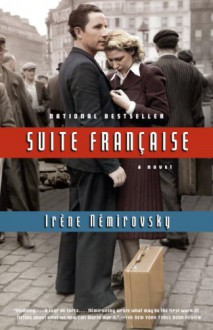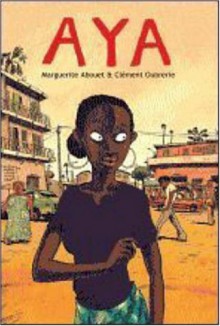
"War … yes, everyone knows what war is like. But occupation is more terrible because people get used to one another. We tell ourselves, 'They’re people just like us after all,' but they’re not at all the same."
Irène Némirovski — famed writer, Russian emigre, and woman of Jewish ancestry — in the midst of World War II, and in the hands of the third Reich, began writing a novel. She did not live to see the end of the war or the end of the novel, but what she did write of that novel is what we have here under the title Suite Française. Némirovski's work stands out from World War II stories I have read throughout my life, in particular those popular in America: It is not about America and it is not about the fighting of the war. The focus here is on the French civilians living in the shadow of war, people trying to survive and continue their lives in a world turned upside down.
Némirovski planned to write five parts for her novel, but only produced the first two before she was captured. The story starts in (free) Paris as news arrives that the French army is in retreat and the war is coming. We follow a handful of French citizens trying evacuate the city — specifically the wealthy Péricand family, working class Jeanne and Maurice Michaud, their son Jean-Marie, the author Gabriel Corte, and the rich Charles Langelet.
Suite Française contains a very human story about the common choices we rarely hear about in the accounts of war. The characters of this book are neither heroic nor villainous in any grand sense. They make small choices that can have big consequences. they are sometimes brave, sometimes cowardly, sometimes decent, often petty. In many cases there is no easy answer at all. The good guys don't always act good and the bad guys aren't always terrible.
In this way, Suite Française feels immediate in a way few war narratives do. The horror of the story is not how alien this world is, but how familiar. Their choices are our choices but heightened. What do you do when you see someone in need? What would you do to others to protect your family? Or just yourself? You wouldn't have to kill someone, just steal gas, or pack your fine linens and drive past a line of people fleeing on foot. And on the other side, acts of kindness like caring for a wounded soldier in your home or helping reconnect children and parents after a bombing. There are many common decisions that suddenly hold the power of life and death in wartime and Némirovski never lets us forget that imperfect humans are the ones having to make these decisions.
When we move into the second part, "Dolce," things get even more confusing. Invasion has given way to occupation and we get a look through the experiences of two households, each forced to house a German officer. "Dolce" takes place mostly in the summer two years after the invasion. Life is not back to normal, but it looks much more like it. Old grievances are renewed, people bicker and gossip, and we are told, despite numerous proclamations of French solidarity, that the townsfolk were reporting their neighbors to the Germans from the very start. "If we'd taken them all seriously, everyone in the region would be in prison," the German officer says.
Meanwhile, the officers are gentlemanly, polite, kind even and they live in these homes for months, and politeness in return is compulsory. Over months grudge melts into kindness, respect and even affection (thus the epigraph to this essay). We know what the Nazis (as a whole) stood for, what they perpetrated against Jews and other minorities, but one person can be complicated, a soldier, we are reminded several times, does not set the policies. As an abstraction, years later, Nazi's appear as pure evil, but as individuals, in the houses of the protagonists, the image is less clear. In fact, Germans in this town act much like American soldiers later in the war. They give sweets to the kids, offer to help carry groceries, and pay well at the local shops. In this way, Suite Française reveals our humanity both in the capacity to transcend, and our weakness to, the worst parts of ourselves, and in this book it is hard to even know which parts those are.
The tension in "Dolce" seems to pull tighter and tighter until you can't stop reading. The friendship between Lucile and a German officer seems to draw inexorably toward disaster. Némirovski writes at her best at these moments when her characters are torn between what they want and what they know is right and even possible. Quiet, impossible feelings spring up between people despite themselves. It's not a naughty affair, but a tragic affection expressed through a song on the piano, a look at a ring, blanched faces, or a startle when the real world reinserts itself into a quiet moment on the lawn.
Suite Française feels defined almost as much by what is included as by what is not. Hitler is not mentioned at all until very near the end. Jews and concentration camps aren't mentioned at all. This feels very strange if you do not read the appendix that is included with Némirovski's diary entries about the book. I have often skipped afterwords and appendices in recent years, but since this novel was so conspicuously unfinished I decided to read them. Now I wonder at what more this book could have become. Némirovski kept the horrors to the margins while she told us when it must have seem that way to citizens. She invites us to feel as conflicted as many may have felt at the time — and from her notes it appears she too was sympathetic to individual soldiers — before dropping hard truths in the next sections. The reality of the Nazi rule would intrude disastrously on our protagonists and they would find themselves colliding in different ways, trying to survive the new, even more insidious threat of occupation. The final two sections of the novel she never even outlined; they would depend on the outcome of the war.
Unfortunately, Némirovski, and her story, in Auschwitz on August 17, 1942. What remains is written with a rare heart and clarity, untainted by nostalgia, parades, or narratives of heroes and villains. It's a story of ordinary people living in turbulent, dangerous times, and Suite Française is especially charming, and haunting, for that reason.


 Log in with Facebook
Log in with Facebook 

















